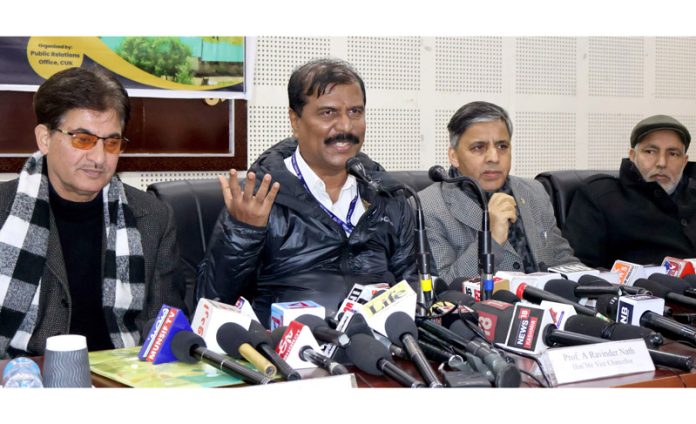Excelsior Correspondent
Srinagar, Jan 16: The Vice Chancellor of the Central University of Kashmir (CUK), A Ravindra Nath, today acknowledged the institution’s current deficiencies in infrastructure and workforce for effective functioning while emphasising that the Government allocated a whopping Rs 496 crores for infrastructure development at the Tulmulla campus in the Ganderbal district of central Kashmir.
Addressing a press conference here, the VC said the Finance Commission has sanctioned Rs 496 crores for eight school blocks and two hostels at the Tulmula campus and that this substantial funding will play a crucial role in enhancing our infrastructure.
The VC said that the university is presently operating with only 50% of its faculty, hindering student admissions. “Despite having 195 sanctioned posts, we struggle to attract the best talent. Currently, we have 75 faculty members, and we are actively recruiting for the remaining 52 positions. Once we have a full faculty, student enrollment will undoubtedly increase,” he added.
Addressing the implementation of the New Education Policy (NEP) 2020, he highlighted efforts to provide experiential learning for students. “We are identifying educational hubs in cities like Delhi, Chandigarh, and Bangaluru and establishing partnerships with industries for student internships,” he said.
He further detailed the university’s commitment to an outcome-based curriculum, offering financial incentives to students based on merit and economic status. “We aim to cover accidental insurance for all students and provide variable tuition fee waivers up to 100% based on economic criteria,” he added.
The Vice-Chancellor discussed the fee structure, which is designed around credits. “A semester will comprise 20 credits, for a total of 40 credits in a year. Additionally, students opting for SWAYAM courses on the platform will receive a 28% fee waiver, encouraging them to pursue diverse courses,” he said.
Highlighting international collaborations, he said, “We have already signed an MoU with a Malaysian university, with plans for two more from Malaysia. Future collaborations are in the pipeline with Gulf nations and West Asian and East Asian nations, as our students culturally align well with these regions.”


